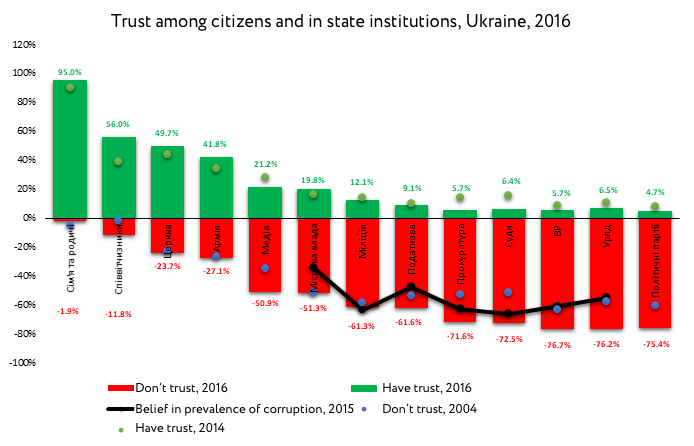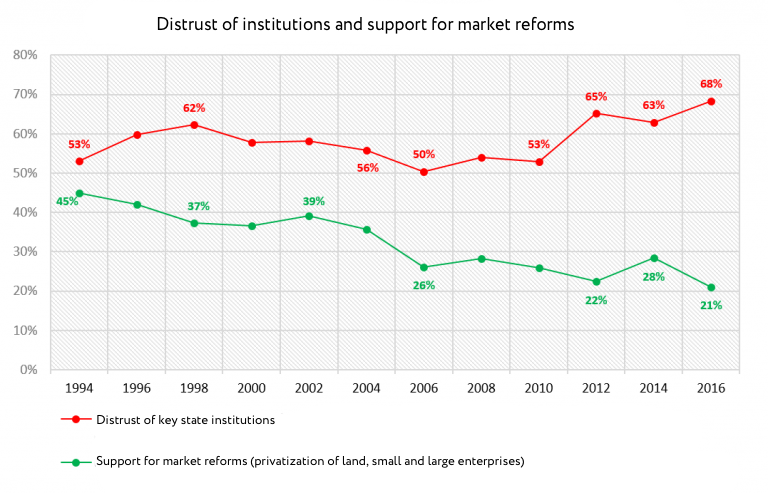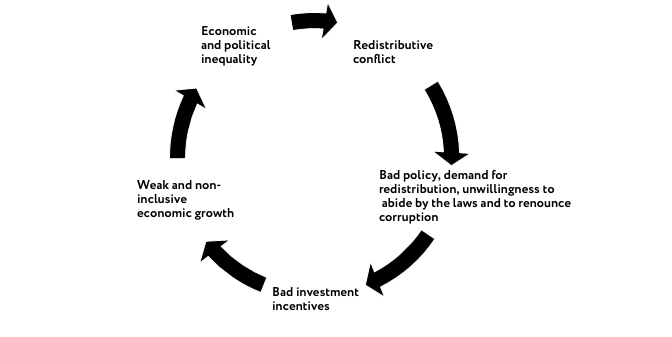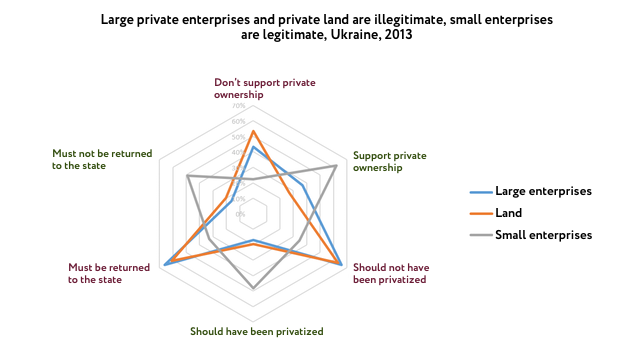In Part One of this article we described why Ukraine did not succeed implementing post-Soviet reforms and becoming a successful country. As the state transformed into a rent seeking mechanism it brought the country to unequal opportunities, economic underdevelopment and inability to implement effective change “from the top.” Now we will discuss how it changed the character of Ukrainian society and its ability to fight for reforms “from the bottom up.” How Ukrainians lost confidence in the key institutions, increased support for redistributive policies, found themselves among the unhappiest nations and became world champions of distrust towards the Government.
With emergence of crony capitalism, the Ukrainians were losing confidence in their political leaders and the key institutions of the state. The capture of politics by influential groups, unequal economic opportunities, inability of the state to perform its functions, stagnation of incomes of a majority of the population – all of that had inevitable political consequences.
In the beginning of post-Soviet transformation, most citizens were not sure whether the country had any political leaders capable of effectively governing the country; now the majority is convinced that there are no such leaders (Figure 1).
Figure 1. Are there any political leaders in Ukraine today who can effectively govern the country?
Source: Institute of Sociology of the National Academy of Sciences of Ukraine (NASU)
According to a Gallup Institute poll conducted last year, a mere 9% of the Ukrainians trusted the Government. This is the lowest figure in the world. At the same time, citizens were getting more and more confident that the authorities and business are corrupt. In 2010, 77% of citizens believed that corruption was widespread in the Government. У 2018, the share rose to 91%. In 2010, 76% of citizens were of the opinion that corruption was prevalent in business. In 2018, the share went up to 82%.
Just as dramatic was the situation with confidence in most institutions of the state, whose efficient performance is a prerequisite for a successful market economy and democracy. Confidence in most of them does not rise much above the level of statistical error; from the mid-2000s it only kept decreasing. There is good agreement between the level of distrust and the perception of the most discredited institutions, which are believed to be corrupt (Fig. 2).
Figure 2. Name of Figure

Source: NASU Institute of Sociology, KIIS
Interestingly, confidence in relatives and compatriots remained relatively high and even increased. Yet this comes as no surprise in a country where familial and informal connections are often more appropriate for solving life’s problems compared to relevant state bodies, whose inefficiency and improprieties can even make matters worse.
Under conditions of economic instability, inefficiency of laws and weakness of state institutions, citizens were getting more convinced that their problems could be resolved by strong political leaders (Fig. 3).
Figure 3
Source: NASU Institute of Sociology
While results like these give rise to apprehensions that authoritarianism may be close at hand, sociologists say that this is unlikely to happen. In Ukraine, trust in new leaders tends to decline quickly. And attempts to concentrate power without trust and legitimacy rarely end with something good for the autocrats. Therefore, the Ukrainians’ demands for a totalitarian style of rule are a symptom of dissatisfaction with the quality of democracy and the inabilities of the state rather than a sincere desire to “bring back Stalin.” Since the institutions are weak, citizens simply have nothing to rely on. In addressing more down-to-earth problems, they rely on their family and friends/acquaintances. In addressing problems common to society as a whole, they hope for the emergence of a leader capable of bringing down the bad system.
The reasons for the decline of confidence observed in the post-Soviet countries were reviewed in a multitude of economic studies. Where political and legal systems were capable of defending the interests of most citizens, an orderly transition from planned to market economies was successfully provided for. Where numerous groups remained defenseless against the difficulties of the transition process and were disappointed with its results, confidence in the newly created systems decreased (Bjørnskov 2012).
While confidence decreased because of the difficulties of the transformation and the unfairness of its results, further research showed that a declining confidence leads to even greater problems. In Part One of this article we have shown how social mobilization and civil movements can prevent the ruling elite from abusing power or blocking the necessary reforms “from the top.” Now we will show how distrust of the “system” can undermine the ability of society to undertake positive changes “from the bottom up.”
The trap of distrust and the bad “balance”
Support for a number of reforms decreased as the level of post-Soviet dissatisfactions went up. State bodies were losing confidence while traditional market liberalization reforms were getting less popular (Fig. 4).
Figure 4. Name

Source: NASU Institute of Sociology *Average of the percentage of citizens having no trust in state bodies (local authorities, police, tax inspection, prosecutor’s office, courts, Verkhovna Rada, Government, political parties) **Average of the percentage of citizens with a positive attitude towards privatization of land, large and small enterprises
Market reforms, however, are not the only thing that can be adversely affected in a society struck by distrust. The country can fall into a trap in which low trust, destructive policies, and weak economic growth mutually reinforce one another. The relationships between trust, quality of policy, and pace of economic growth are reviewed in recent generations of research on political economy of reform. They show that:
- Economic and political inequality, along with the belief that the system is corrupt, brings down confidence and gives rise to a redistributive conflict in the society.
- Combined with the expectations that others will violate the rules, this leads to citizens’ demand for destructive policies of redistribution, unwillingness to abide by the laws and refuse to participate in corruption.
- Destructive policies, along with corruption and lawlessness, have a negative impact on incentives to invest and on the pace of economic growth.
- A weak and non-inclusive economic growth brings confidence even further down and aggravates the conflict. And so on around the circle (Fig. 5).
Figure 5. The vicious circle of distrust and incomplete reforms

Source: Compiled by the author
Now we will review it all step by step:
Redistributive conflict gives rise to a demand to destructive policies. If political and economic institutions do not work for the benefit of the majority and fail to provide for an even distribution of political rights and economic opportunities, this reduces citizens’ confidence in the “system” and gives rise to a redistributive conflict. People begin to rank personal benefits higher than social interests and to value politicians’ honesty lower than their redistributive promises (Alesina et al. 2013; Alesina, Angeletos 2005).
The point is that under conditions of high corruption, lack of rule of law and low state capacity, politicians’ reformist promises are rarely fulfilled. Therefore, people are more responsive to short-term benefits like pre-election “buckwheat packages,” pension bonuses, or a guaranteed job in a public institution. Politicians, in their turn, are aware of the distrust and rejection of reformist promises by citizens – and so they resort to clientelism and redistributive promises in favor of certain groups of voters instead of reformist rhetoric and economic growth policies (Keefer 2007).
Corruption and lawlessness generate corruption and lawlessness. The belief that the system is corrupt and the representatives of the ruling elite are increasing their wealth through illegal means is among the most important factors underlying the dissatisfaction of the population of post-Soviet countries with their lives and their reluctance to support the policy of economic liberalization. Moreover, Ukraine is at the forefront of this trend. Such dissatisfaction, along with the beliefs about the dishonesty and corruptness of the “system,” can reduce citizens’ commitment to the principles of the rule of law (Djankov et al. 2016; Denisova 2016).
Belief that corruption is widespread leads to strengthening of destructive norms. If people are convinced that corruption is a normal phenomenon and most of those around them are involved in it, this enhances the incentives to also engage in it. Even if these people themselves sincerely hate corruption and believe that it is harmful. This is so because in a corrupt environment citizens involved in corruption get better opportunities, while individuals for whom honesty is a matter of principle can incur losses or face social pressure. This pertains to ordinary citizens as well as entrepreneurs and public servants.
- For an average citizen, refusal to bribe a doctor or a teacher may lead to impaired health or non-issuance of an education certificate.
- For an entrepreneur, refusal to bribe a customs official or a tax inspector may result in failed deliveries or even loss of business.
- For an official, refusal to accept bribes contrary to their corrupt colleagues’ practices may mean losing his/her job or facing constant pressure.
Although society as a whole benefits from reducing corruption, each individual citizen, businessperson or official is ready to renounce it only if others do so too. Renouncing corruption in a corrupt environment makes one pay a tangible price. And the more widespread corruption is, the higher is the “price” (Fisman, Golden 2017).
Quite similar is the situation with observance of laws. People are ready to abide by the laws only when they are sure that others will do so. Rule of law works as a balanced system – either no one violates the law and if there are a few perpetrators they get punished or all violate the law and no one is punished. If the system is abuse proof, constructive norms are developed within it, shifting the system towards a “good balance” and helping to maintain it. On the contrary, widespread abuses lead to strengthening of destructive norms (Basu 2018).
It is very hard to change such norms, because this requires changing expectations. More citizens must become confident that the people around them will abide by the laws and that if there are occasional offenders they will undergo punishment. If, however, lots of compatriots drive when the light is red or steal money from the budget, each citizen feels less motivated to follow the rules.
This dilemma can be better managed if people standing up for an even “playing field” and signaling the necessity to change the norms are mobilized. For example civil movements against corruption and offenses. Yet there is a problem here as well.
The belief that the system is unfair leads to unwillingness to participate in it. For example, if voters get information on corruption among the authorities and see no oppositional alternatives of good quality, they can simply stop going to the polling stations and reduce their support for democracy. The higher is the perceived level of corruption, the fewer people believe that democracy is the best form of government (Fisman, Golden 2017).
In Ukraine, political participation of the pro-democratic middle class has decreased during the years of independence, while citizens with lower income levels and less democratic views have remained politically active. This can be accounted for by the fact that senior citizens have past experience of Soviet political mobilization and are therefore “quicker on their toes.” Another underlying factor is that senior citizens with lower incomes are more dependent on the state and on its services and hence more interested in remaining part of the political process and more actively respond to politicians’ redistributive promises. In the meantime, the more well-to-do middle class is likely to less frequently encounter the ineffectiveness of the state and can renounce a part of its services (Pop-Eleches 2009).
In such an environment, it is very hard to implement changes. They are blocked, on the one hand, by influential beneficiaries of the status quo, and on the other hand, by wider segments of the population who support redistributive policy, refuse to abide by the laws, and do not take part in political life. Therefore, even new leaders with high quality proposals may fail to secure the support they need to implement the changes (Dixit 2017).
What kind of reformers and reforms are necessary to get out of this trap
To implement changes, the reformers must have:
- The right incentives and dependence on broad interests. The main reasons for the lack of incentives for politicians include their corruptness, orientation towards the interests of narrow groups, and unwillingness to lose sources of rent income and power.
- Legitimacy in the eyes of the citizens. As a rule, politicians are lacking legitimacy on account of their corruptness or because citizens perceive them as being corrupt. Also, politicians lose legitimacy if their agenda does not include problems of greatest concern to the population.
Where legitimacy comes from
While market economy and democracy have an institutional basis, the viability of the institutions themselves depends on cooperation of people around common rules and their willingness to protect those rules. To that end, there should be an increase in expectations that the new rules will work to the benefit of the majority and will not be used arbitrarily or operate in the interests of certain groups (Rose 2015).
For a society struck with distrust, higher legitimacy may be the reformers’ key instrument in getting society on their side. Numerous studies show where it can be sourced from.
Legitimacy proceeding from the possibility to choose your own rules. One of the most important sources of legitimacy is the democratic process. People support their leaders’ policies and decisions when they feel that they can influence the process and that these are their own decisions as well. Therefore, policies and institutions developed in line with a broad social consensus have more chances to persist than those written in narrow circles, imported from the outside, or implemented under international pressure.
Legitimacy proceeding from cleansing of politics. When politics is perceived as dirty and corrupt, its cleansing can become a source of legitimacy for implementing a wider set of changes. Moreover, this leads to improved quality of bureaucracy – due to the breaking of the limits of political patronage as well as to the change in officials’ expectations regarding the new rules and norms.
Legitimacy proceeding from reforming areas associated with state capture. Reforms in areas controlled by influential interest groups are blocked even if they are supported by technical evidence, offer significant benefits to society and enjoy popular support. Therefore, it is important to reform those areas in the first place, limiting the political influence and the sources of rent income. To that end, it is necessary to determine where that influence comes from – the lack of transparency of political finance; the possibility of simultaneous ownership of assets in media, business and politics; the possibility of unimpeded laundering of money, etc. Sometimes, by using significant resources and media, status quo beneficiaries succeed in biasing the population against the reforms or the reformers and in diverting public attention to matters of secondary importance, e.g. those relating to religion, foreign policy, or ethnocultural antagonisms.
Moreover, people tend to resist reforms in areas that they believe have been captured by oligarchs. When asked whether they support private ownership of large enterprises, whether it was appropriate to privatize them, and whether it is expedient to bring them back to state ownership, most Ukrainians say that they do not support private ownership, that the large enterprises should not have been privatized, and that they should be returned to state ownership. The situation regarding privatization of land is much the same. But when they are asked about small enterprises, the opposite picture is observed. Most citizens support private ownership of small enterprises, say privatizing them was the right thing to do, and do not want them to be returned to state ownership (Fig. 6).
Figure 6

Source: NASU Institute of Sociology
To increase the legitimacy of market reforms and private property itself, first it is necessary to convince the people that the new rules will work for their benefit and that their rights will be protected in the process of change. Unless the people are certain of that, they will remain opposed to the reforms and will defend the status quo.
Legitimacy proceeding from transparency. At the early stages of post-Soviet reforms, a technocratic narrative prevailed: it was believed that the reforms should be carried out by technocratic politicians, without too much communication with society. Two decades later, researchers reached the opposite consensus: transparency is a key condition for successful reforms; and it is important how people vote in elections.
Reform is a change of status quo. Reforms are legitimate if they are “real” reforms, changing the inefficient status quo in the eyes of the population. When any regulatory change or policy that is useful for economic growth is presented as a reform, the term becomes meaningless. Especially when citizens do not believe that something has substantially changed for them.
Legitimacy proceeding from expansion of the list. If the current agenda lacks legitimacy, perhaps it should be expanded. Citizens may refuse to support reforms in areas such as e.g. cancellation of state energy subsidies, in spite of being aware of their harmfulness. The belief that politicians are corrupt makes citizens see such reforms as particularly suspicious and unfair. Therefore, the success of the communication of decisions of this sort depends very much on confidence in the leaders, which can be won only by implementing more popular changes. If, however, the reforms being implemented do not involve limitation of the sources of rent income and power, the agenda will be formed by populists.
Social norms must keep up with new rules. Neither ordinary citizens nor public servants will change their behavior or accept new “rules of the game” merely because society will benefit from them and their usefulness is confirmed by evidence. To prevent a rollback of the changes, society must share the view that they are appropriate and be willing to comply with the new rules. If citizens’ behavior and norms do not correspond to the newly created institutions, changes occur on paper only and status quo defenders easily turn the situation to their benefit.
The three decades of post-Soviet studies show that the causes of the Ukrainian failure lie at the crossroads between economics, politics and society. Under conditions of partial reforms and widespread abuses, competition does not work, economic opportunities are not available to everyone, and society gets into a trap in which low confidence, destructive politics, and weak economic growth mutually reinforce one another. In order for the reforms to become politically possible, citizens must believe that the reform fruits will be distributed evenly and that their rights will be protected in the process of change. To avoid creating a demand for populists and “strong leaders,” citizens must see that the institutions of the state perform their functions, do not serve narrow interests, and operate on the basis of common rules. Citizens will not abide by the rules and renounce corruption without expecting others to do so. The ineffective status quo can be changed and the country’s economic potential can be released only through reforms establishing an even “playing field.” The legitimacy needed for implementing the changes can only be achieved by reformers capable of convincing citizens that this will really happen.
Attention
The author doesn`t work for, consult to, own shares in or receive funding from any company or organization that would benefit from this article, and have no relevant affiliations



